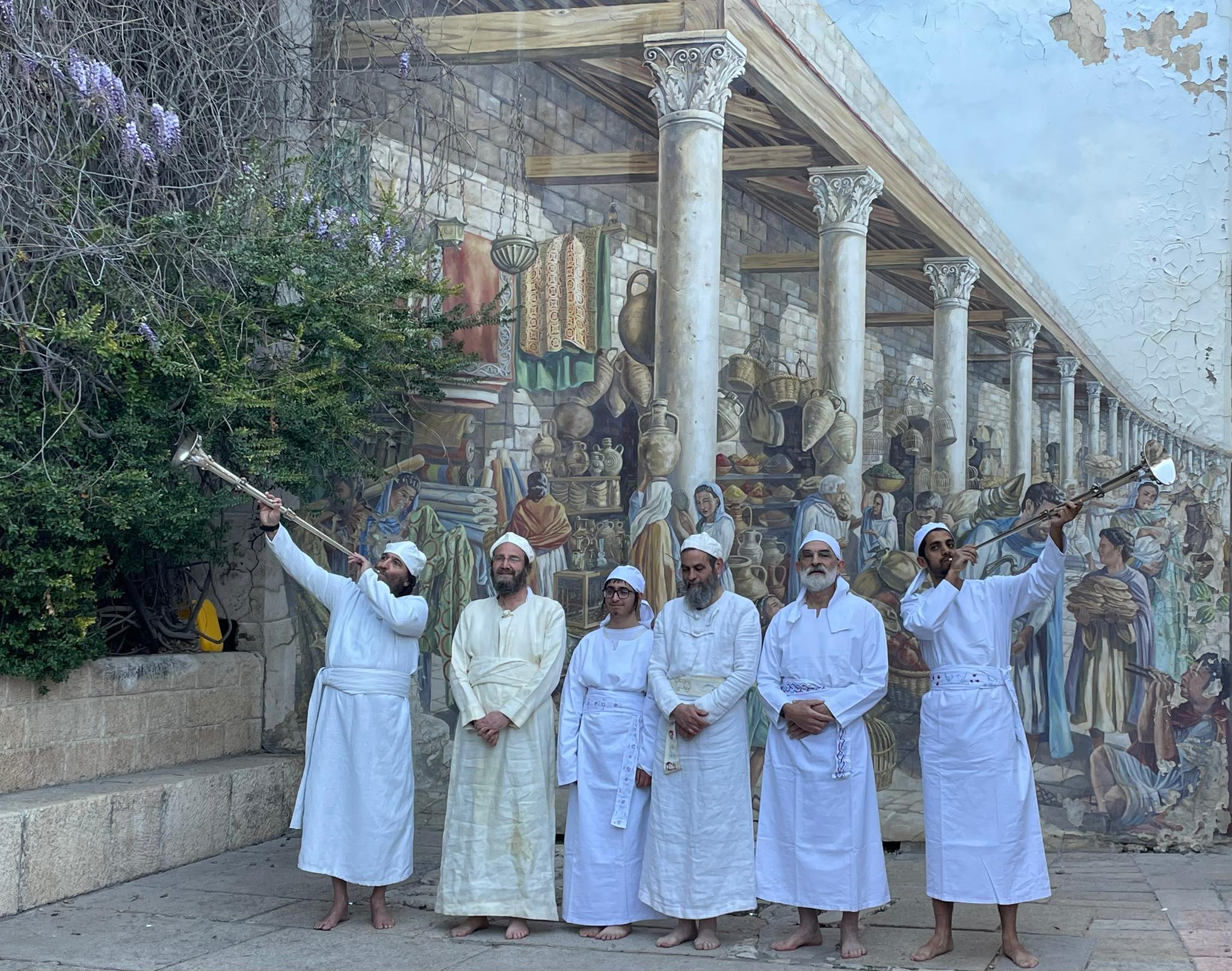The United Temple Movements held a reenactment of the Passover offering on Sunday a few hundred meters from where the original sacrifice was offered when the Temples stood in Jerusalem.
Several hundred people attended the reenactment that was held near the Dung Gate in the Old City of Jerusalem. Kohanim (Jewish men who have a clear ancestry of being descended from Aaron, the first High Priest) wore the Biblically mandated priestly garments and used utensils that had been specially prepared by the Temple Institute for use in the Third Temple. Rabbi Baruch Kahane acted in the place of the Kohen Gadol (High Priest) for the purposes of the reenactment. The ceremony was accompanied by blasts from silver trumpets specially prepared for use in the Third Temple. Musicians played songs based on the Hallel service, a prayer service composed of verses from Psalms, that was sung in the Temple while the Passover sacrifice was being prepared.
The Kohanim reenacted another aspect of the Passover ritual by forming a line and transferring the gold vessels containing the blood by passing them hand over hand. In the Temple, these lines of Kohanim stretched from the courtyard where the lambs were slaughtered all the way to the altar upon which it was poured. In the actual Passover sacrifice, the lamb would then be taken and roasted to be eaten in the person’s home at the Passover seder.
Reenactments have been taking place every year for more than ten years. Josh Wander, a resident of the Mount of Olives, attended the event.
“It is important to emphasize that this was not a sacrifice in any manner,” Wander told Israel365 News. “Jews are required by the Torah to engage in the Temple service and the Passover offering is one of the most important sacrifices. But the only place we can do so is on the Temple Mount where the altar was located.”
At the same time, Wander emphasized the importance of the reenactment.
“The Jewish sources go into great detail describing how the Passover service was carried out but there are many details that can only be figured out by actually doing the ritual,” he said. As specified in the Torah, a lamb was ritually slaughtered under the auspices of the government’s veterinary ministry. The actual slaughter was conducted out of view of the public due to concerns raised by animal rights groups.
Aryeh King, the Deputy mayor of Jerusalem, took part in the ceremony, marking the first time the municipality has chosen to be visibly represented at the event.
“This is the legacy of Israel,” King told Israel365 News. “In the past, the municipality played a minor and unseen role in the event. It is essential that the government take part in this. This reenactment was one of the more significant aspects expressing this legacy and it is a positive development that the city decided to play a major role.”
Last month, a group of rabbis petitioned the government to allow the Passover sacrifice to take place. There has been no response to their petition.
Alternatively, Rabbi Shmuel Rabinowitz, the Chief Rabbi of the Western Wall and the Holy Places, announced on Tuesday that it was forbidden to bring animals to the area with the intent of making a sacrifice.
“The Western Wall Heritage Fund operates according to the instructions of the Chief Rabbinate of Israel, which for generations has opposed any act of this kind, and in accordance with the authority of the Western Wall Rabbi, has been preventing such actions for years, and will continue to do so this year as well,” Rabbi Rabinowitz’s statement said.
The importance of the reenactment was underscored last year when Rabbi Aryeh Stern, the chief rabbi of Jerusalem, ruled that the Korban Pesach (Passover sacrifice) is incumbent upon the Jewish people even in current times, even in the absence of a Temple structure or lacking a Red Heifer to purify Israel. However, the sacrifice may only be performed on the Temple Mount. The only obstacle to performing the Passover service is the government’s refusal to allow it to take place despite Israeli law requiring religious freedom for all. It should be noted that the Sanhedrin ruled that at this juncture, one sacrifice made at the Temple Mount brought in the name of the entire Jewish people would suffice.
The Korban Pesach is of utmost importance. There are only two mitzvot (Biblical commandments) for which non-compliance receives the most severe punishment mandated by the Torah, karet (being cut off from the community or excommunicated): brit milah (circumcision) and the korban Pesach (Passover sacrifice).
The Torah states explicitly that the requirement to perform the Passover is eternal:
And ye shall observe this thing for an ordinance to thee and to thy sons for ever. Exodus 12:24
Like every other public time-bound sacrifice, the Passover sacrifice must be brought even in a state of ritual impurity.In his commentary on the Bible, Rabbi Shlomo Yitzchaki, the preeminent 11th-century French Torah scholar known by the acronym “Rashi” stated that the Jewish return to Israel and the end of exile will not be complete until the Passover sacrifice is reinstated in its proper place and at its proper time.




